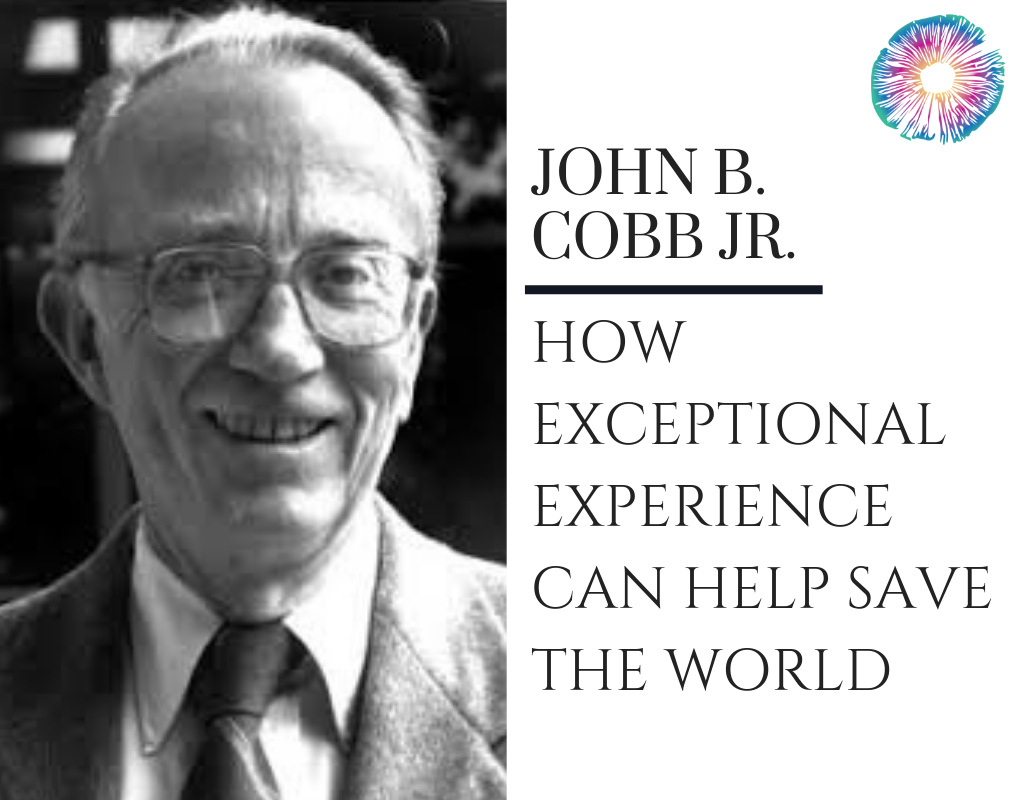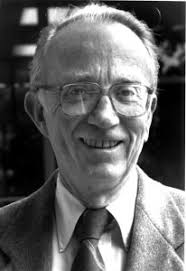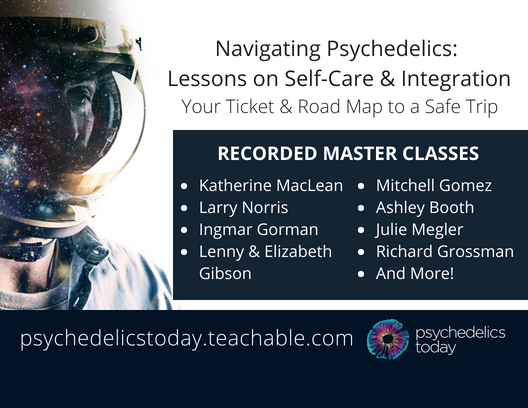
In this special interview, Joe and Kyle sit down with Theologian, John B. Cobb Jr., referred to as the Godfather of American Theology. They recorded with John at the conference they all attended in California, on how exceptional experience can help save the world. They cover a range of topics inspired from Alfred Whitehead’s teachings and the promising applications of Whitehead’s thoughts in the area of ecological civilization and environmental ethics pioneered by John Cobb Jr.
3 Key Points:
- Process thinking argues that reality consists of processes rather than material objects, and that thinking this way is similar to the teachings of a psychedelic experience. It is hoped for and believed that exceptional experiences can help save the world.
- Whitehead’s process philosophy argues that there is urgency in coming to see the world as a web of interrelated processes of which we are integral parts, so that all of our choices and actions have consequences for the world around us.
- Certain curriculum, education systems and Universities are not helping us to see the value of our world. A full systems change is needed and hopefully psychedelics, exceptional experiences and process thinking can help with that.
Support the show
- Patreon
- Leave us a review on iTunes
- Share us with your friends – favorite podcast, etc
- Join our Facebook group – Psychedelics Today group – Find the others and create community.
Navigating Psychedelics
Trip Journal Integration Workbook


Show Notes
Process Thought
- Alfred North Whitehead
- The senses heighten connection, but we shouldn’t rely only senses for our experiences
- The label that can we give to the ‘most fundamental relationship’ is any ‘happening’
- What’s happening when we listen to music?
- We aren’t hearing one tone after another tone, we are hearing the music as a whole piece
- Whitehead calls the fundamental relationship of inclusion, a ‘prehension’
- How one moment leads into another moment
- If the world is made up of prehensions, then in any given moment, what is prehended?
- The boundary between conscious and unconscious experience is fuzzy.
- Whitehead calls the relatedness to the past, physical prehensions. But we also prehend, potentialities. It is being experienced as potential not as actual.
- Whitehead thinks this is present in very elementary matters.
- Whitehead says that waves of vibration are a very large part of the world we live in
- Whitehead believes that without some type of variation from moment to moment, that nothing really happens
- He wrote a lot on relativity and very little about quantum
- David Bohm
- He was very process oriented
- He wanted to change our language into using words that mean something is ‘happening’ versus using nouns that say that something ‘is’
- “If you only have potentiality and too little grounded in actuality, you better be careful. If you don’t have the potentiality, then you live in a deterministic universe” – John
“Does Whitehead relate the potentialities to his ideas about intuition?”
- Intuition can be of both pure potentials and about other people
- A lot of paranormal experiences are not supernatural
- Just because someone has seen something or done something, it doesn’t mean that it’s true. There is plenty of illusion.

Complex Societies
- An important feature of Whitehead is to distinguish complex society
- Panexperientialism is ‘the view that if evolution of humans goes all the way down to subatomic particles, then human ‘experience’ by deduction must have originated at the subatomic level, which implies that not just humans but individual cells, individual molecules, individual atoms, and even individual subatomic particles, such as photons or electrons, incorporate a capacity for ‘feeling’ or degree of subjective inferiority.’
- There might be in-deterministic qualities in individual entities
- From a Whiteheadian point of view, contemporary physics would be almost universally valid if the entire world were made up entirely of physical feelings, feelings of actual occasions, ‘what is’.
“What would be opposed to physical feelings?”
- Conceptual feelings, feelings of potentials
- He thinks there are feelings of potential in every actual occasion
- “The attempt to make standard physics apply to the quantum world are a total failure.” -John
- “The attempt to make standard physics apply to the human experience is the task of the Neuroscientists. They think that the subjective experience has a causal role to play in the world.” -John
- It’s more committed to metaphysics than it is to empirical study
“Do you think what’s going on in the mind, say neurotransmitters or electrical activity firing, that is creating this reality, or the experience, is having an influence on the neurochemistry?”
- John says that the psyche plays a role
- Scientists who are busy engineering genetic change, tell us purpose plays no role in genetic change
“What do you mean by no purpose in genetic change?”
- Purpose cannot have a causal effect in the Cartesian world
- They say ‘I know that my purposes are completely the result of mechanical relations between my neurons’
“Could you elaborate on the definition of actual occasions?”
- The psyche is a consistent series of actual occasions
- Its what kinds of things are in and of themselves, ‘actual’
- It’s in the distinction of things that can be divided up into other entities
- An actual occasion cannot be divisible into other actual occasions
- Like an atom, it is divisible, but dividing it does not keep it from actually existing
- For Whitehead, an actual occasion is the basic unit of actuality
- Its an alternative to a ‘substance’ way of viewing
- When we look at other living beings, animals with brains and such, we assume they have a psychic life
- John thinks that plants have some kind of unified experience
- Some people have a feeling about a tree, that it’s not just a bunch of cells interacting
- “It’s hard for me to think that a stone is an experiencing entity, I think the molecules though are.” – John
- “I’m sure that cells are influenced by the emotions of people” -John
- Having a particular conceptuality does not define how things are going to map out
“This world view seems very psychedelic.”
- Among quantum physicists, Whitehead’s name is known and appreciated.
- It may mean that physics as a whole might adopt an organic model than just mechanistic one
- The common sense in this is that our knowledge of each other is not just in visual and auditory clues, but people have been told so long that it is
“What else would it be informed by if not by visual and auditory cues?”
- Just by our immediate experience of each other
- If you go into a room, there is an immediate climate there. You can tell when you walk into a room full of angry people.
- Ivan Illich’s Book on Deschooling Society (Open Forum S)
“What would be your vision of an education system if its not working right now?”
- The one that Matthew Segal teaches in CIIS are examples of a different education system
- The Great Books program needs revision. It’s only been the great western books. John hopes they have incorporated great books from other parts of the world
- There are parts of different educational systems that are better than what we have
- “If I had an opportunity to create a school, it would be a school that teaches ecological civilization because a healthy human survival is a goal that ought not to be regarded as an eccentric and marginal one, but regarded as what all we human beings ought to be getting behind collectively, together. And if you have a school for that, the curriculum would be quite varied, but the production and consumption and sharing of food should be a very central part of it.” -John
- Capitalism has ignored much of reality
- John says creating a curriculum is not his role, his role is deconstruction because he thinks what is going on now is absurd
- “Enlightenment is the worst curse of humanity, we have been enlightened into not believing all kinds of things. The disappearance of subject from the world of actuality. If that’s enlightenment, then I don’t want to be enlightened.” – John
Language
- John thinks we need a lot of reflection on the language we use
- The questions that are the most important are the ones rarely asked
- “One of my favorite parts of Whitehead is the reframing of language, our words carry inertia that we are not aware of” – Joe
- Whitehead Word Book: A Glossary with Alphabetical Index to Technical Terms in Process and Reality (Toward Ecological Civilzation) (Volume 8)
- The reason there are 36 universities for process studies and 0 in the United States, is because in the US, process isn’t as fundamental as substance
Kyle Shares his Near Death Experience
- Kyle got in a snowboarding accident, ruptured his spleen and lost about 5 pints of blood
- It became mystical when he was in the MRI machine and he was standing on one side of the room with the doctors and in his body at the same time
- There was an orb of light, and an external voice or ‘experience’ that said “you’re going home, back to the stars where you came from, this is just a transition, the more you relax into it, the easier it will be.”
- Kyle describes it as a blissful experience, but he had a hard time integrating it back into his life.
- Whitehead has done a remarkable job to describe process, and exceptional experience and putting a language to it
- Joe says that Whitehead’s work has helped put the psychedelic experience into words
“Do you recall the first time you heard something that made you interested in the impact of psychedelics?”
- Lenny Gibson was probably one of the first people that opened his eyes to the positive uses
- “Today, it would be remarkable if 10% of the world’s population survived without civilization” -John
- He is confident that there are good things that come from psychedelics
- He says Whitehead has made him understand the changes that might make us behave in responsible ways, so he doesn’t feel the necessity of having a psychedelic experiences
“What kind of changes?”
- We have to change from our substance thinking to process thinking
- We need to shift from thinking that every individual is self-contained, we are all products of our relationships with each other.
- In the Whiteheadian view, any individual is, the many becoming one. To be an individual is being a part of everything.
Links
Website
Process Theology: An Introductory Exposition
Other books by John Cobb Jr.
A Christian Natural Theology, Second Edition: Based on the Thought of Alfred North Whitehead
Jesus’ Abba: The God Who Has Not Failed
Grace & Responsibility: A Wesleyan Theology for Today
For Our Common Home: Process-Relational Responses to Laudato Si’
About John B. Cobb Jr.

John B. Cobb, Jr., Ph.D, is a founding co-director of the Center for Process Studies and Process & Faith. He has held many positions, such as Ingraham Professor of Theology at the School of Theology at Claremont, Avery Professor at the Claremont Graduate School, Fullbright Professor at the University of Mainz, Visiting Professor at Vanderbilt, Harvard Divinity, Chicago Divinity Schools. His writings include: Christ in a Pluralistic Age; God and the World; For the Common Good. Co-winner of Grawemeyer Award of Ideas Improving World Order.


